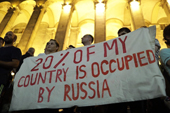Revisiting basic tactics - Russia expels 8 Georgian companies from wine market
By Natalia Kochiashvili
Tuesday, June 25


Following in the wake of political tensions and rallies in Georgia sparked by an appearance of Russian State Duma MP in the Parliament of Georgia last week, the announcement of the Rospotrebnadzor agency was released on Monday.
The agency is claiming that the number of Georgian alcohol products which don’t meet their standards has increased by 2.9 times from 2014 to 2018.
The quantity of Georgian-produced alcoholic drinks that were identified as incompliant with mandatory requirements amounted to 203 k.L in 2018. Because of that, they intend to tighten control over Georgian products - all batches of the indicated products were prohibited from entering the territory of the Russian Federation.
The list of wine producing companies includes some major ones: “Bagrationi 1882”, “Baller and Company,” “Kakhetian Traditional Wine Making,” “Badagoni,” “Georgian Wine House,” corporation “Georgian Wine,” “Georgian Wine and Alcoholic Beverage company,” “Batono.”
This move is reminiscent of a 2006 embargo. In December 2005, the federal department of Russian veterinary and phytosanitary banned the export of fresh vegetable products to Russia from Georgia on the pretext of violating the standards of microbiological composition. Russia put an embargo on Georgian wines in March 2006, and since October 2, 2006, the Russian Federation suspended postal, automobile, aviation, sea, railway connection with Georgia. The ban hit the Georgian exports, with the 2005 figures for wine sent to Russia halved after federation’s move. The embargo on Georgian products was lifted only in 2013.
Georgian government began looking for alternative markets in the aftermath for its alcohol exports - a significant element of Georgian external trade - following the incident.
As for now, Russia still holds its place in the top ten exporting countries list, the share of export is 12%. According to the statistics of Russian Federal agencies, Georgian wine occupies 3-4 places in the Russian market.
Interestingly, just like the politically-driven Russian embargo on Georgian wine in 2006, this embargo can be an opportunity for Georgia to re-orient economy away from dependence on Russia.
Must be recalled that Rospotrebnadzor made the same statement last year. As they stated, the safety analysis revealed that the technology of producing was violated and that neither state nor the manufacturer could control this. Therefore, they announced steepening quality and security control.
Addressing this fact, Georgian National Wine Agency reported that, in 2018, Georgia exported 86.2 million bottles (0.75 l) of wine to 53 different countries, which is a record high number for the last 30 years.
Russian officials called for a boycott of Georgian resorts and trade goods in the wake of the protests - called “Russophobic” by Duma MPs - while president Putin suspended flights to Georgia starting July 8.
The protests were sparked by Russian Duma MP Sergey Gavrilov’s address to the parliament of Georgia as he headed the Russian delegation to the Interparliamentary Assembly on Orthodoxy in the Georgian capital.
Gavrilov took the seat of the chairman of the parliament, which sparked fury of opposition MPs and later thousands of citizens of the country on the backdrop of the ongoing occupation of Abkhazia and Tskhinvali (South Ossetia) by Russian troops.
